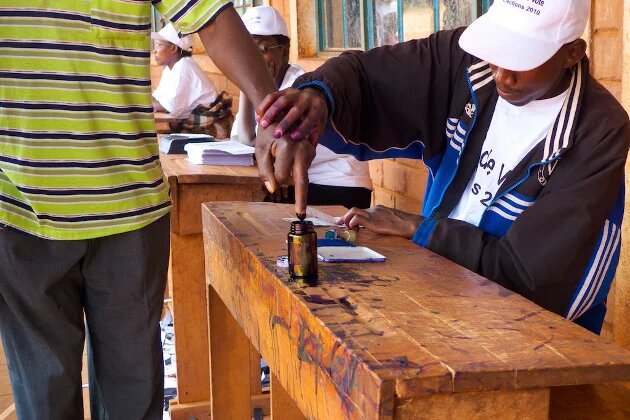
In Burundi parliamentary and local elections are held today regardless of criticism and unrest. The incumbent President is running for office for the third time, although he therefore violates the Constitution.
Political deadlock and a humanitarian catastrophe
Since Pierre Nkurunziza announced his intention to seek a third term as president at the beginning of this year, Burundi has been plunged into a crisis of staggering proportions. A constitutional court ruling in May 2015 upheld the president's position, but opposition parties, civil society groups, religious leaders and a section the ruling party National Council for the Defense of Democracy–Forces for the Defense of Democracy (CNDD-FDD) disagree.
Violent repression of protestors by police and the intimidation of citizens by a militia group linked to the ruling party have led to the death of at least 70 people while around 80 people have been jailed for participating in the protests. In addition, an estimated 100,000 refugees have fled from the country in the second quarter of 2015, and a regional humanitarian catastrophe looms, particularly in Tanzania, the Democratic Republic of Congo (DRC) and Rwanda which are receiving refugees. Above all this is the spectre of a return to civil war which could significantly undermine efforts to attain stability in the Great Lakes Region, as several other conflicts are underway in neighbouring countries, notably the DRC, South Sudan, Central African Republic and Uganda. Worse still, possible militant ethnic solidarities between pro-regime groups in Burundi and a predominantly Hutu militia opposed to the Rwanda government based in the DRC could further escalate these existing conflicts.
Opposing forces maintain that president Nkurunziza has served two terms in accordance with the constitution and the Arusha agreement signed in August 2000 to end the civil war that began in 1993. If he runs, it would be for a third term, which is unconstitutional. The recent wave of protests, rallying around a movement against the third presidential term, crystallized and intensified after the president made his plan official and subsequent clearance by the National Elections Commission (CENI) alongside other candidates. However, two crucial points are noteworthy. First, signs that president Nkurunziza was laying ground for a forced third term became apparent from as far back as 2012, when the political dialogue between ruling party and opposition leaders collapsed. The president, with a narrow support base in the ruling party and the army, has, over the last two years, sustained repression against opposition and civil society activities, engaged in tactics to divide the opposition and bar opposition candidates from the anticipated elections. Secondly, arguments about misinterpretation of the law advanced by the Constitutional Court are now considered propaganda for President Nkurunziza. The issue at the core of these claims is the relationship between the Arusha agreement and the Burundi constitution. The points of law may be further explored in expert analysis, but there is no doubt that the Arusha agreement is the lifeblood of nation-building in Burundi after the civil war. It has to be treated as such, especially in the search for solutions to the current political gridlock.
Political Solution
Political dialogue is the ideal way to restore peace in Burundi. It is the structure and agenda of such dialogue that will determine its outcome. Already, political dialogue failed in 2012 and recent attempts spearheaded by the UN collapsed after the murder of opposition leader Zedi Ferusi on May 23rd. Some adjustments to the strategy are necessary. First, the efforts by regional and international actors should be collaborative rather than hierarchical. The East African Community (EAC), the African Union (AU) and the UN will need to work together. The inclination to grant the lead to the proximate regional body (EAC) while others only 'support' ought to be avoided as such proximity comes with considerable constraints to performance in the role of peacemaking. That's why the direct involvement of the UN is plausible, but it needs to be connected to the efforts of the EAC and AU, possibly under one banner of an international initiative for peace in Burundi. Secondly, the collective efforts of the EAC, AU and UN need to establish strong links with the people of Burundi, through organized groups and communities. This will not only avail them first hand experiences and views of the people, but it will also provide a strong ground for the work of international actors to fend off political blackmail by parties to the conflict.
Furthermore, it will be necessary to place two critical items on the agenda for political dialogue: the politics and (un)constitutionality of president Nkurunziza's third term bid; and the relationship between the Arusha Accord of 2000 and the country's constitution. Specifically, the dialogue should revisit the socio-political and economic programmes of the transition period and assess successes and failures in their attainment. The agenda for political dialogue needs to be framed in these broad terms and all specific issues, including arguments for and against third presidential term, weighed on this scale.
In sum, peace-building in Burundi will necessarily evaluate the progress of state-building on the basis of the Arusha agreement. But it must go beyond that to examine the internal political and social constraints to achieving the vision of nationhood, partly elaborated in the Arusha agreement. Granted, urgent decisions will have to be reached and enforced in the short-term to end the violence, address the humanitarian situation and stop its further escalation while creating a conducive environment for political dialogue. But the ultimate objective is a rejuvenation of the nation building project in Burundi, posing critical questions as may be necessary from a good reading of the country's history and present circumstances. In all of this, the people of Burundi will have to talk to each other candidly about the dividing lines as well as individual and collective historical suspicions and fears. This can only happen if the people organize, within civil society and other forms of peoples' organizations, outside the political structures established by parties to the conflict.